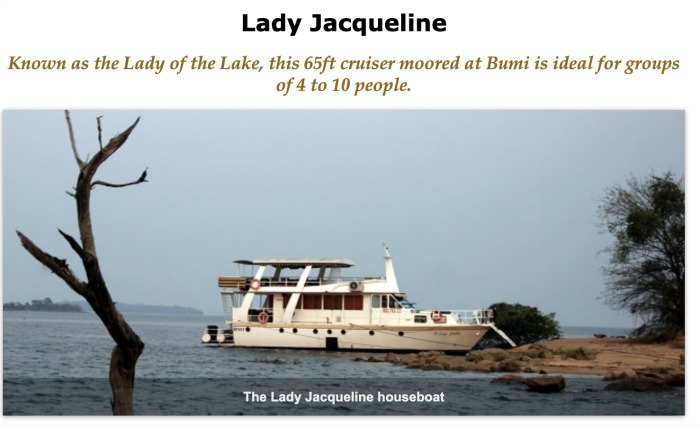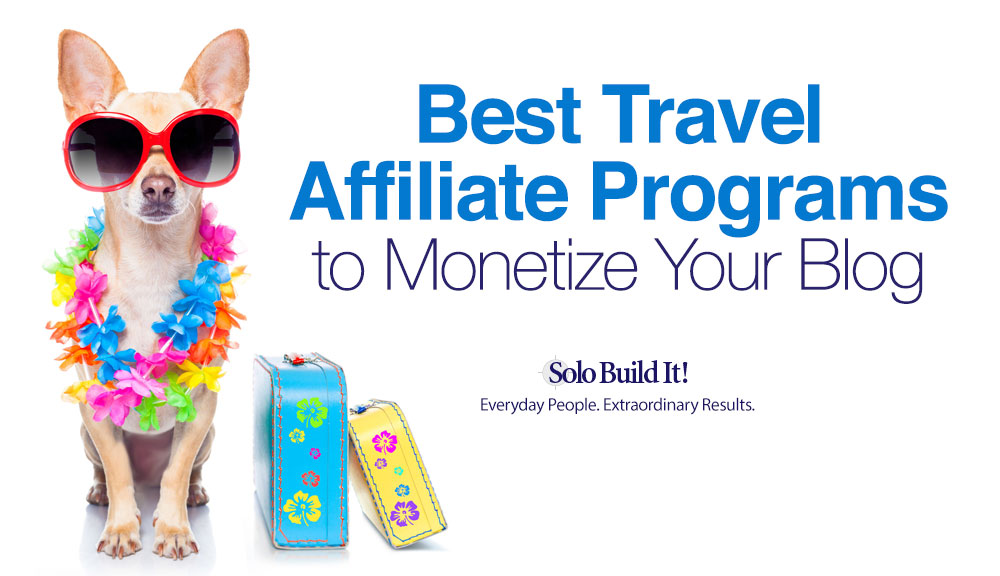
As a travel blogger, which are the best affiliate programs to join? Before I answer this question, let’s first take a step back.
Large sites dominating the travel industry with multi-million dollar ad campaigns rule the search results. It’s a crowded niche, and it’s hard to stand out.
So is it even still possible to make a living with affiliate marketing in the travel niche? It’s tough, but not impossible. Let me show you how to prepare your travel blog for affiliate marketing success. After that, we’ll look at pros and cons of the most popular travel affiliate programs.
Prepare Your Travel Blog for Affiliate Marketing Success
Stand Out in Your Niche
Affiliate programs need traffic from your site. Without traffic, no number of tips will be effective. Getting the click starts with people visiting your site.
Those visits depend on you creating excellent content that gives visitors something different from anything they can find on the large travel sites, which are your competitors.
Bear in mind that visitors to a travel blog may not be ready to buy immediately. They’re not likely to be looking for information this early in the booking process. They need to find good quality, detailed but basic destination information that they can’t find elsewhere.
How to attract visitors that early? Do things differently.
Create high quality content using your own “voice.” Don’t create another TripAdvisor or Booking.com. Provide unique information about places and cultures you know like the back of your hand. Use social media to build even deeper connections with your audience. Take inspiration from this family travel business and their huge following on Facebook.
A teenager started the Anguilla Beaches travel website back in 2003. It concentrates on a very personal experience of the island of Anguilla. As a result, the large travel companies haven’t affected it. Its content is unique, so it has no real competition.
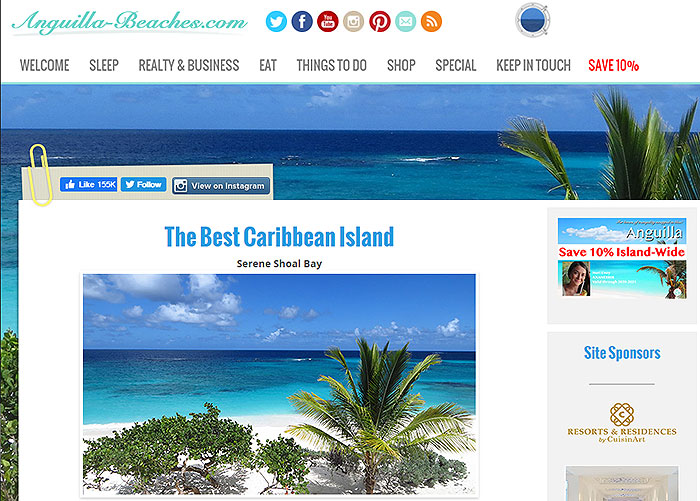
If you’re writing about a location because you know and love it, you have a story to tell. Use that story to attract visitors to your blog.
Take Action: How can you brand your blog content? What can you tell your visitors that they won’t find in any other travel blog?
Address Your Visitors’ Problems and Needs
Most travel sites are targeted at a wide audience — a scatter-gun approach. Customers are left to work out for themselves the venue, hotel, and tours best suited to their needs.
Your opportunity is to beat the big guys by being specific. Your excellent, unique content is most likely to convert visitors to customers only if you put those visitors’ needs first, last and in the middle of your thinking.
What possible problems might your visitors face on vacation? What needs do they have? For example, if your niche talks about the excitement of finding “hidden gems,” will they need reassurance about the safety of going “off the beaten path”? If they might visit Vatican City, will they want to know what’s acceptable attire?
Find out what your visitors’ problems and needs are, and address them in your content.
For example, in her video interview, Elyssa Bernard talks about problems visitors to Italy have with understanding toilets!
It may seem an unlikely subject for a travel blog, but it’s the kind of information travelers may feel too embarrassed to ask about!
Take Action: Who is your ideal site visitor? What are her needs for the perfect vacation? What problems might she face, and how can your content address those needs or help solve those problems? How can you make her feel that your content has been written just for her?
Make Your Travel Niche Specific
You’ve found your individual “voice” to draw your audience in. You’ve examined your visitors’ problems and needs, decided what you can offer to help satisfy them, and given them that information.
Next comes the detail. Be specific. Don’t just talk about a place of interest. Explain how to get there, what time of day is best to visit — even where the toilets are!
Rhonda and Tom Muir, for example, in a fascinating video interview about their site, Orkneology.com, talk about offering both an authentic, individual experience — “archeology made personal,” as Tom puts it — and very specific details their visitors are looking for when they visit Orkney.
Tom says:
“The difference with folktales from some places is that it will be once upon a time, in a forest somewhere unspecified… whereas here, it’s on that rock — no, not that one, the one slightly to the right… It’s very, very site-specific.”
Take Action: What specific information do you have about your niche that would help your visitor? If you don’t have that level of detail yet, how can you find it?
Make Your Travel Affiliate Links Specific
It follows from everything we’ve covered that links to your affiliate products — hotels, tours or accessories — should be specific to the product rather than, for example, a general banner or “book here” link, or a search box. Evidence shows that those general links don’t convert as well.
If the affiliate link is on a page covering more than the product, place it close to the product. For example, if you have a page about visiting the Trastevere district of Rome and you’re recommending a specific hotel on that page, the link should go there, not in a list of links at the end of the article, or in a box in the right column.
In this example, the first link goes directly to an affiliate program, the second to the site’s hotel review containing affiliate links.

It may sound obvious, but you’d be surprised how many travel blogs get it wrong!
Remember: your visitor is looking for specific recommendations. Don’t make her hunt for the links.
Take a look at Tony and Boo’s take on affiliate marketing for their successful Victoria Falls blog. Their accommodation pages, for example, offer out-of-the-ordinary places to stay that they know will appeal to their targeted visitors.
Links come only after the detailed review, which clearly shows they know what they’re talking about. And the link goes directly to the specific accommodation they recommend.
Never create links that promise one thing but lead to something else. For example, the keywords “Hilton Barbados” used as a link might create lots of visitor clicks through to your affiliate. But if that affiliate link destination is the Travelodge Barbados, those visitors will wonder why, and may never return.
It’s click-bait, which will result in loss of trust.
Take Action: Add banners and search boxes to your blog and test them. Do they convert? How do they compare with specific links to individual products? How can you write a compelling call to action for each affiliate link that will ensure your most wanted response?
Choose Your Travel Affiliate Partners Wisely
The annual vacation is something people look forward to all year. It’s a big investment, both financially and emotionally, often seen as the time to recharge batteries.
To increase your conversion rate (the number of visitors who click your affiliate links and buy), it’s critical that your blog visitors develop trust in all your information, both content and recommendations. It’s particularly important in the travel niche, where fake reviews are common.
Which means choosing travel affiliate programs carefully. Check them out. What are their landing pages like? How deep do their links go (the deeper, the better). How well laid out are their pages? Are they professional in their approach? How user-friendly is their site?
Your bottom line question should always be: “Would I recommend this product to a friend?” If the answer is “no,” then no matter how much commission you may think you’ll earn, don’t use it.
Remember: you’re not selling a product. You’re recommending something that you genuinely believe will enhance your blog visitors’ experience and give them the holiday of a lifetime.
Andrew and Maria Smith have three successful websites about Italy. They use a number of affiliate products and networks to monetize their sites and, crucially, they make members of their “Secret Italy” subscription pages feel like “a long lost cousin… part of the family.”
Their recommendations are so highly thought of by site visitors that, as Andrew says:
“Many people now book vacations through our links, even to destinations we don’t feature at all. I’ve had people book accommodation from Chile to China via my affiliate links!”
Take Action: Which affiliates can you rely on to produce quality goods, time after time? Check out every affiliate you plan to use.
Popular Travel Affiliate Programs to Join in 2020
If you’re just starting in affiliate marketing, you may find this selection of well-known travel affiliate programs helpful.
Travel Agency and Hotel Affiliate Programs
When you’re starting out, it’s a good idea to use a travel agency type booking affiliate program rather than an individual hotel chain’s program. For example, if you feature a luxury chain like Four Seasons but your visitor decides it’s too expensive, you lose a sale.
Feature a luxury hotel on an agency site and, should the visitor cringe at the expense, she’ll look for another possibility, and you’ll potentially save the sale.
These are some of the best booking sites for hotels.

Airbnb: We’re including this because it’s such a well known site for travelers. However, it’s not for beginners in the travel niche — affiliates need a minimum of one million website / blog visitors per month, and a solid social media presence. Details of the affiliate program are sketchy.

Booking.com: one of the top hotel affiliate programs,Booking.com is user-friendly for the publisher (that’s you!) and for the customer.
Pros:
- Easy to sign up, easy to use.
- Banner links, interactive search box and deep links to individual hotels via text links, or link to your own images.
- Over one million potential accommodations, including hotels, private rentals and some out-of-the-ordinary places (tree house, anyone?!) for the more adventurous traveler.
- All reviews are by guests verified to have actually stayed at the accommodation.
- Commission begins at 25% of the commission Booking.com earns from each booking and increases the more completed stays are booked through your blog.
Cons:
- Commission is calculated between 30 and 60 days after the confirmed stay, which means you’re waiting a long time for your first payout!
- Payment threshold (i.e., what you need to earn before you’re paid) is $/£/€ 100.

Expedia: another well known and trusted travel agency brand.
Pros:
- Commission paid on flights, cruises, tours, activities and car rentals as well as accommodation.
- Banner links, search box and deep links to individual hotels.
- Commission ranges from 2% to 6%.
- “Best price guarantee” may reassure travelers.
- Constant coupons and deals on offer.
Cons:
- Must be joined via an affiliate network (CJ Affiliate).

TripAdvisor: a massive, trusted brand.
Pros:
- Deep linking to individual hotels is encouraged.
- Pays on revenue generated on clicks from TA to any of their affiliate hotels.
- One of the highest travel affiliate programs’ commission structures: 50% of the gross revenue.
- Two week cookie — one of the longest in the business.
Cons:
- Unlike Expedia, Trip Advisor does not pay out on anything other than hotels.
- Must be joined via an affiliate network (CJ Affiliate).
- Trip Advisor has had issues with fake reviews. Learn how to spot them.

Sandals and Beaches Resorts: One of the most well-known names in Caribbean travel, this is one of the top hotel affiliate programs. It’s worth joining only if you have a niche based in the Caribbean, and an impressive presence online.
Pros:
- A high-end, luxury platform with an average affiliate earning per booking of $137.
- Commission of 4% paid on both accommodation and activities, including meals.
- 60 day cookie.
- You’ll have a dedicated affiliate manager to support you.
Cons:
- As one of the most high-end products in the travel niche, Sandals can afford to pick and choose their affiliates.
- Must be joined via Awin or CJ Affiliate.
Flight Affiliate Programs

Skyscanner: Apart from the Expedia program, this is one of the few platforms to offer affiliate commissions on flights.
Pros:
- One of the most popular platforms for comparing flight prices.
- 50% commission on the revenue made by Skyscanner per booking.
- Pays on hotels and car rentals as well as flights.
- Deep links available.
Cons:
- Only available via an affiliate network, which varies from country to country. See the information page for details.
Cruise Affiliate Programs
If your niche relates to cruises, whether specifically or as part of your wider topic, a cruise-related affiliate program is a must.

Cruise Direct: Commissions for cruises may seem low, but remember, given the high ticket price, it can add up to a substantial income.
Pros:
- 3% commission on gross sales.
- 45 day cookie.
- Banners, links and search boxes all offered.
- Weekly newsletter includes bonus commissions for affiliate partners.
Cons:
- Deep links not offered at the moment, but “coming soon”!
- Can only sign up through CJ Affiliate.

Cruise Compete: This platform is the Skyscanner of the cruise world. It compares the prices of cruises between different companies.
Pros:
- Compares best prices, which is popular with potential customers.
- Each time one of your visitors creates a new account, requests a quote and books, you earn 3% commission.
- 90 day cookie.
- Join directly via the Cruise Compete website — no need for a third party.
Cons:
- TripAdvisor reviews suggest that prices for customers may be cheaper when buying direct from the cruise line.
Tour Affiliate Programs
We’ve already seen that the larger platforms like Expedia sell tours as well as accommodation and flights.
However, it’s worth considering a specialist tour company as an affiliate partner. They tend to offer the best prices and the most local, experienced guides.

Viator is one of the most popular. I use this company for my Italian website because of their unique services, which my site visitors love. One of my most successful affiliate links is to Gladiator School in Rome!

Pros:
- Commission is 8% of all completed tours, including shore excursions.
- 30 day cookie on over 200,000 products.
- Global coverage with local tour guides, and the opportunity for customers to book.
- Many unusual experiences not found anywhere else, as well as standard tours.
- Imaginative, user-friendly information about each tour, including videos and star ratings from verified customers.
- Excellent, responsive customer service for affiliate partners.
Cons:
- Available only via the affiliate network ShareASale.
Accessory Affiliate Programs
Why not think wider than the usual hotels, cruises, flights and tours? Thinking about your blog visitors’ needs as they plan their vacation widens your affiliate potential exponentially.
Help them not to stand out like a sore thumb in their destination. Suggest clothes, shoes and accessories that will be a good fit with the culture of the country they’re visiting. And what about luggage, ways to keep money and travel documents safe, travel insurance, travel pillows and blankets, travel adaptors, maps — even Kindle readers?
The possibilities are almost endless. But, remember your first and only priority: to serve your customers.
Do not go over the top recommending random products. If you suggest a particular item, talk about it within an article or a specific product review. For example, Elyssa Bernard uses affiliate links to suggest helpful items to pack for a visit to Rome.
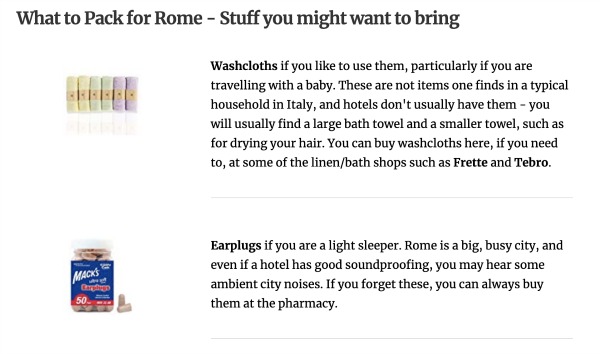
The best affiliate platform for all of this? Hands down — Amazon.
If you’re not yet an Amazon affiliate, our affiliate marketing for beginners article will help you make a start right now.
Take Action: Examine one of these affiliate platforms closely. Does it have products that will serve your audience? Implement a product on your blog before moving on to another.
Partnering With Local Companies
Know a local company that offers great products and excellent customer service, but they don’t have an affiliate program?
Don’t be afraid to approach them and ask if you can work out a deal. It’s not as simple as joining an existing travel affiliate program. Many small companies, though, are reluctant to join a platform because they lose part of their profit. So they may be willing to do a deal with you directly.
Sarah Kok, in her interview about her travel blog, discusses how she uses local companies to provide a more personalized experience:
“I have some friends from the tourism industry who run tours in Montenegro, so I started out by contacting them and that got me started… I knew these people personally and I was happy recommending their tours — I’d done a lot of them myself.”
Take Action: Think about local products that would not be available anywhere else. Approach the providers with a proposal about how you might sell their products on your blog.
The Bottom Line
It may seem almost impossible to break into affiliate marketing in the travel niche, but we’ve seen several examples of how it can be done — and they’re only a handful of successful bloggers.
Creating a blog or website and building traffic is your first priority, using unique, well-written content that addresses your visitors’ problems and needs.
It’s worth waiting until you have several hundred unique visitors a day before applying to travel affiliate programs. They’ll want to see potential in return for sharing their services — and their income.
Choosing the right affiliates and using them as a solution for your visitors’ needs, emphasizing the benefits of the features, is the way forward.
Remember: your aim is not to compete with the large corporate entities. You’re not selling to a customer.
You’re providing unique experiences to a trusting friend.
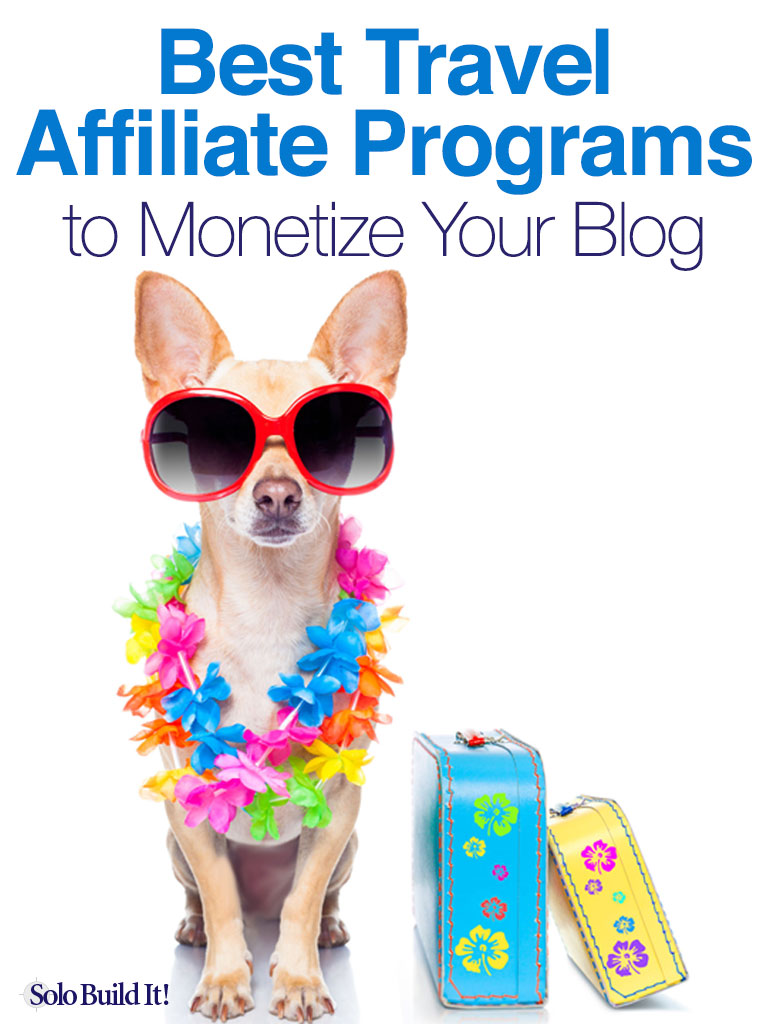
Cath Andrews
Latest posts by Cath Andrews (see all)
- Start a Passion-Based Business and Live Your Dream - February 1, 2023
- What Do You Say When Their Eyes Glaze Over? - December 20, 2021
- How to Monetize Your Email List in 5 Simple Steps - October 26, 2021

